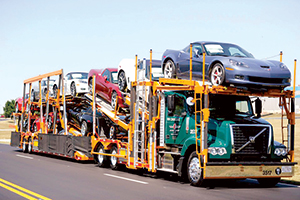Contract Talks Between Teamsters, Car Haul Management to Resume

Contract talks between the Teamsters and management negotiators for automobile transporters are due to resume this week as the parties seek to reach a tentative deal after union rank-and-file workers soundly defeated an earlier four-year proposal.
The talks, which are restarting after a break for the holiday season, are slated for Jan. 13 and 14 in Detroit, said James Osmer, who heads the National Automobile Transporters Labor Division.
His group negotiates on behalf of two companies on the TRANSPORT TOPICS Top 100 list of the largest U.S. and Canadian for-hire carriers — No. 43 Jack Cooper Holdings and No. 74 Cassens Transport — as well as smaller carriers. The union claims 6,000 members in its Carhaul Division.
The talks are resuming a few days after automakers posted their best sales year in history. The Jan. 5 report said car sales reached 17.47 million vehicles in 2015, which topped the previous mark of 17.35 million set in 2000.
Negotiations resumed first in mid-November after the rejection of a contract proposal that would have extended through Aug. 31, 2019. The previous contract expired on Aug. 31, and Teamster car-haul workers have stayed on the job under contract extensions since that date.
“We don’t know yet whether we will reach an agreement,” Osmer told TT on Jan. 5, without elaborating. “We are hopeful we can do that.”
Kevin Moore, president of Local 299 in Detroit and chief negotiator for the union, told TT on Jan. 6 that he believed a tentative agreement could emerge from this week’s talks.
“There are still a few things to work out,” he said, also without elaborating.
“We have to make sure we satisfy the members’ needs,” he said, in areas such as maintaining health-care benefits and addressing working conditions for car haulers who have “one of the toughest jobs in our Teamster universe.”
“Car hauling is a very tough job and a very dangerous job,” Moore added. “We have to stand our ground to make sure our members and the general public are protected.”
The parties decided to suspend talks over the holidays so the union could better evaluate additional operating information that has been provided by the employer group.
The earlier contract proposal was defeated by a 6-1 margin despite the recommendation of negotiators from the Teamsters National Automobile Transporters Industry Negotiating Committee that the tentative agreement be ratified.
About two-thirds of new vehicles are being hauled by nonunion carriers, Osmer said. Jack Cooper is the largest car hauler, and Cassens is the third-largest. United Road ranks second.
While neither side would discuss details of the negotiations, the proposal that was rejected made some changes in the way that car haulers were paid for deliveries of new vehicles to dealers. Those deliveries, known as skid drops, previously were paid separately, but the tentative agreement rolled the first two skid drops into the overall pay for mileage.
In the rejected deal, the wage increases were set at 2% on Dec. 27, then 2% on Sept. 1, 2016, 2% on Sept. 1, 2017, and 2.5% on Sept. 1, 2018. However, the increase in the final year would have been reduced or eliminated based on whether workers’ compensation costs exceeded 7% of payroll.
In addition, the rejected deal, which was posted on the union’s website, included increased pension and health-care contributions, rising from $350.70 monthly to $442.54 monthly over the life of the contract.
The earlier tentative agreement was reached just as the previous four-year deal was expiring on Aug. 31. One month after the tentative agreement was reached, it was put out for a vote at the same time that the Central States Pension Fund, the largest provider of retirement benefits, was signaling it was about to cut benefits for retirees. Those benefit cuts, described as a long-term survival plan for a fund whose assets have been dwindling, were on average close to 50%.




